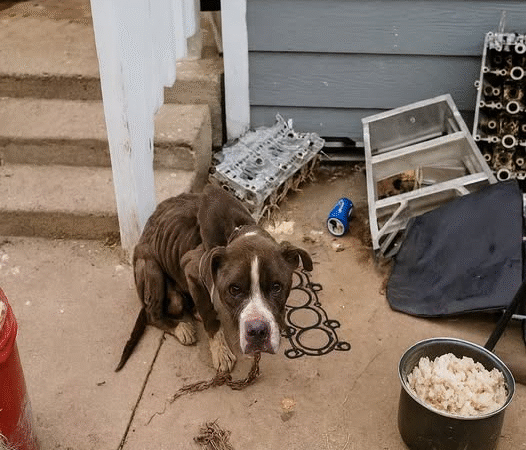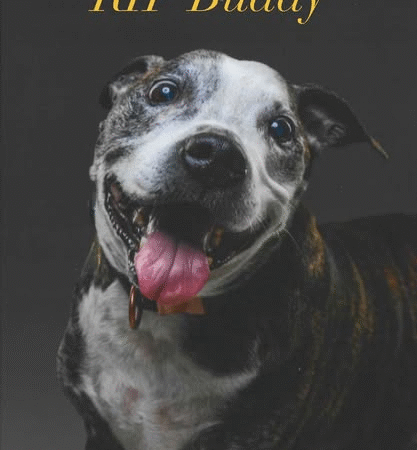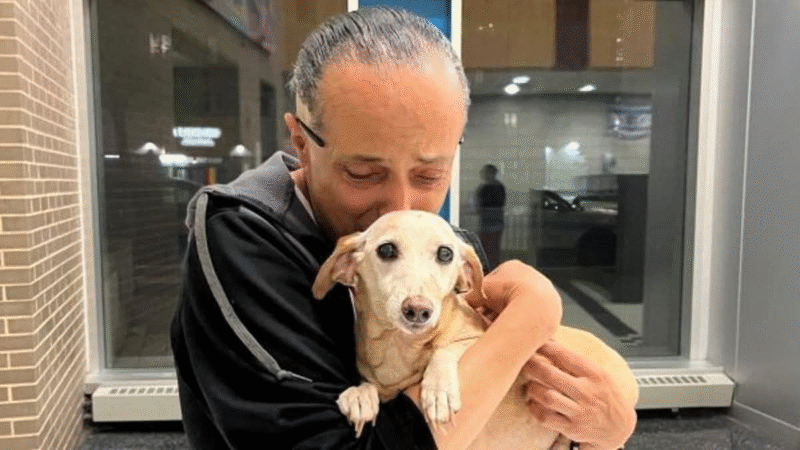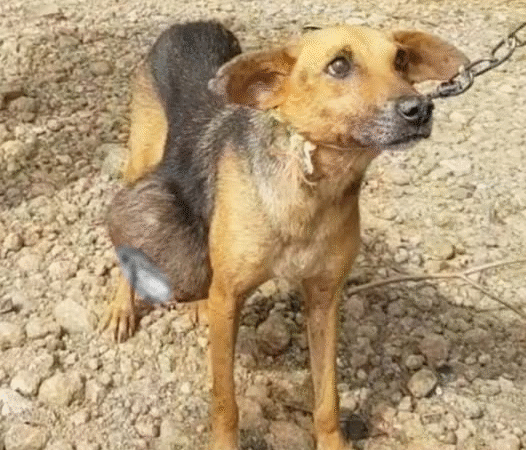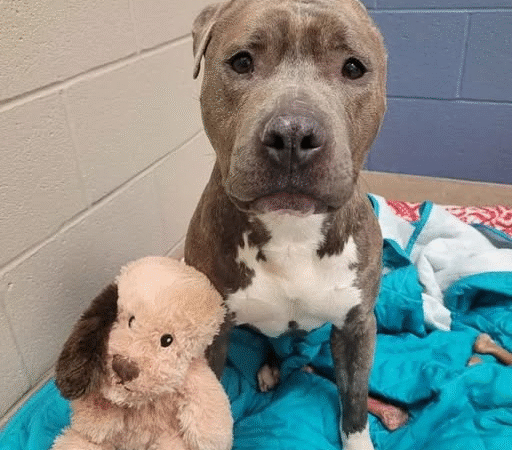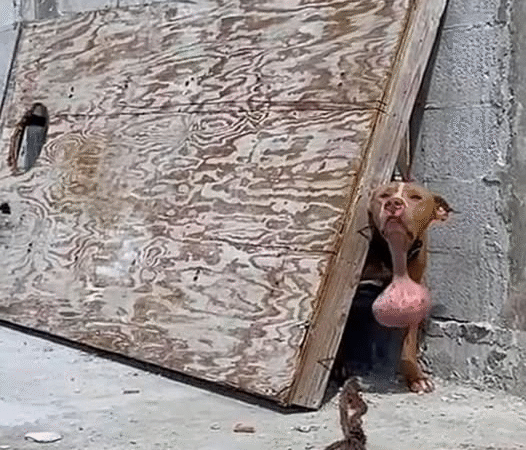The Dog Who Waited by the River

Hulk did not know why the world had changed so suddenly. One moment, his family was laughing and preparing for a holiday weekend, and the next, the river came raging through, sweeping away everything that once felt safe. The July 4 floods did not just take away wood and bricks; they took away the warmth of voices, the smell of dinner cooking, and the sound of footsteps that meant home. For Hulk, none of that mattered as much as the absence of the people he loved most.
When the waters receded and silence replaced the roar of the flood, Hulk returned. His paws pressed onto wet earth, his fur damp and heavy, but his body carried him to where the house once stood. He didn’t look for shelter. He didn’t search for food. Instead, he walked to the last place he had seen them, and there he sat. A floorboard still clung to the ground, battered but surviving, and Hulk curled up upon it as if it were sacred ground.
Each morning, the sun rose over the Guadalupe River, casting a golden haze through the broken trees and scattered debris. And each morning, Hulk raised his head, sniffing the air. Sometimes he caught the faintest trace of perfume or the faintest whiff of a familiar shirt carried on the breeze, and his ears perked up with hope. But then the scent faded, and reality pressed against him again. Still, he did not move. He waited, because waiting was what love required.
The neighbors noticed. They saw him from a distance, a brown figure sitting on the ruins with eyes that searched the horizon endlessly. Some wanted to coax him away, but he growled softly if they came too close. He was not aggressive, only protective. That small piece of ground was his heart’s anchor, and he was not going to leave it until he knew, beyond any doubt, that his family would not return.
Days passed. The Texas heat beat down, but Hulk endured. Nights grew cool, and the crickets sang around him, but he stayed curled tightly, lifting his head at every rustle, every distant voice. Hunger gnawed at his belly, yet he ignored it. Thirst cracked his throat, yet he stayed. To outsiders, it seemed strange that a dog would cling so stubbornly to a broken house. But for Hulk, the decision was simple. Love is not measured in convenience. It is not measured in comfort. It is measured in loyalty, and loyalty is eternal.
Eventually, a call was made to Kerrville Pets Alive, the local rescue group. Volunteers arrived with food, water, and soft words. They expected to see a frightened or aggressive dog, one who might lash out after trauma. Instead, they found Hulk, quiet and dignified, as though he were guarding a sacred shrine. His eyes followed them, wary but calm. When they placed a bowl of water nearby, he glanced at it and then looked back at the river, almost unwilling to drink in case he missed the moment his family returned.
One rescuer whispered, “He’s not waiting for food. He’s waiting for them.” And everyone who stood there felt the weight of those words settle in their hearts.
They did not force him away that day. They sat with him. They spoke gently. They left food behind and promised to return. Each day, they came back, and each day, Hulk remained in his place. Slowly, he began to eat. Slowly, he began to drink. But he never stopped glancing toward the water, never stopped listening for footsteps.
Stories like Hulk’s are not rare, though each feels miraculous. Dogs do not measure time the way we do. They do not despair when the clock ticks endlessly. They only know that someone they love is missing, and their only response is to wait. For a dog, waiting is not passive—it is an act of devotion, as strong as any vow spoken in human words.
News of Hulk began to spread through the community. Pictures of him sitting on the floorboard reached social media, and comments poured in. People wrote about the heartbreak in his eyes, about the beauty of loyalty that outlives disaster. Some offered to adopt him immediately. Others donated to the rescue group, wanting to make sure Hulk received everything he needed. Strangers who had never met him felt tears in their eyes, because in his waiting, they saw something pure that so often feels missing in the human world.
Still, rescuers faced a challenge. How do you convince a dog who has lost everything to trust again? How do you gently lift him from the ruins of his home without breaking the last thread that ties him to his family’s memory? The answer, they knew, would not come quickly. It would take patience, compassion, and the willingness to sit in silence beside him, just as he sat in silence beside the river.
Hulk’s days grew into weeks. Slowly, he began to accept touches, brief at first, then longer. He let one volunteer scratch behind his ears, and though his eyes stayed fixed on the horizon, a faint sigh escaped his chest. Another day, he allowed himself to lean against a leg, just for a moment, before pulling away again. Each gesture was small, but each was a sign that hope had not been completely washed away.
What Hulk did not know was that his story had touched people far beyond Texas. Messages arrived from other states, even other countries, with people saying they had cried reading about him. Some shared their own stories of pets who waited—dogs who had camped outside hospitals until their owners returned, cats who had refused to leave a doorstep for weeks. Hulk had become a symbol, a reminder that love does not disappear when life becomes unbearable.
As rescuers planned his next chapter, they carried a quiet promise: to find him a family who would honor the loyalty he had shown. It could never be the same family he lost—whether they were missing, displaced, or gone forever, no one could be certain—but it could be a new beginning. Somewhere, there was someone who would see Hulk not as a pitbull defined by tragedy but as a soul who had proven, without words, what true devotion means.
For now, Hulk continues to heal. He no longer sits on the ruined floorboard every hour of every day, but he returns there often, as if to whisper a goodbye his heart is not ready to say. He eats more regularly, drinks with less hesitation, and sometimes even wags his tail when volunteers arrive. The grief remains in his eyes, but alongside it grows a flicker of trust, a reminder that even after storms, life has a way of rebuilding.
And perhaps that is the lesson Hulk offers to all who hear his story. Homes can crumble. Rivers can rage. Time can take away almost everything. But love—the kind that waits, the kind that refuses to leave, the kind that sits in silence even when the world has turned to ruin—that love survives. It survives in the heart of a brown pitbull by the Guadalupe River, who refused to leave the place where he last felt whole.
Because sometimes, the greatest acts of love are not loud or dramatic. Sometimes they are as quiet as a dog who waits on broken wood, staring at a river, counting not the hours or the days, but only the love that made a family his world.
And sometimes, they wait forever.

